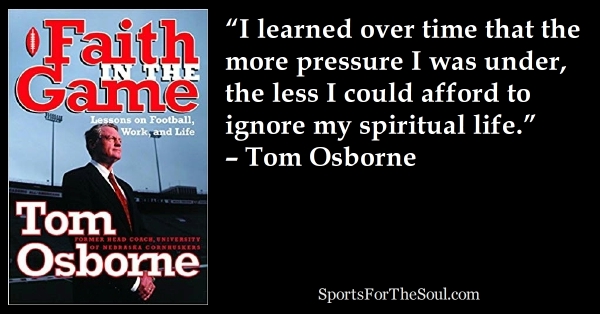 How you start your morning sets the tone for the type of day you will have.
How you start your morning sets the tone for the type of day you will have.
High achievers have long recognized this fact and therefore proactively structure their morning routines. They know that what they feed their minds first thing in the morning will impact their entire day.
Tom Osborne is one of the most successful coaches in the history of college football. At Nebraska, he won three national championships and thirteen Big 8/Big 12 conference titles during his 25 seasons as head coach. In other words, during a quarter-century as head coach, Tom Osborne won a major conference title more often than he didn’t. That’s simply an incredible feat.
Like so many great achievers, Osborne believes his morning routine was a key factor in his success. Interestingly, he started each day in a way very similar to many other coaches and leaders who have risen to the top of their professions…
I rise at 5:30 a.m. each day and spend 45 minutes in prayer, meditation, and the scriptures, and I have found that this has become the most important part of my day.
Often during preparation for a particularly important game, it was convenient to maintain that I was “too busy” to prepare spiritually, as well. There was often not enough time in the day to prepare thoroughly for an opponent, particularly a powerful one. I often felt self-imposed pressure to watch more film, think of all eventualities, and spend more time in meetings. However, I learned over time that the more pressure I was under, the less I could afford to ignore my spiritual life.
We started our staff meetings each day at 7 a.m. The first activity of the day was a short devotional period that usually lasted no more than ten minutes. Several of our coaches felt comfortable reading a verse of scripture and then leading a brief discussion of how that scripture related to our team and daily lives. The devotional period ended with a short time of silent prayer that allowed us to focus on what God would have us do that day.
Attendance at the devotional period was optional. Even though no one was obligated to participate, nearly all of our coaches attended.
The devotional period served to focus our thoughts on God and put the day’s activities in better spiritual perspective.
…
Bobby Bowden and his [Florida State] staff began their coaches’ meeting each morning with a short devotional period, much as we did at Nebraska. It is interesting to note that two of the most successful football programs in the 1980s and 1990s started each day in this manner.
— Tom Osborne, from his book Faith in the Game
The more I’ve studied high achievers, the more I’ve noticed some common habits and beliefs among them. One of the habits shared by so many high achievers is taking time each morning for spiritual reflection.
Tom Osborne pointed out that two of college football’s most dominate dynasties in the ‘80s and ‘90s were run by coaches who started each day in an almost identical way. And Osborne and Bowden were not alone in this practice.
The list of legendary coaches and managers who set aside a significant chunk of time each day to focus on their spiritual lives (despite such busy schedules) is long and impressive: Tom Osborne, Bobby Bowden, Vince Lombardi, Don Shula, John Wooden, Dean Smith, Tony Dungy, Jack McKeon, Tommy Lasorda, Lou Holtz, John Calipari, Urban Meyer, Lenny Wilkens, Augie Garrido, and this list could go on and on.
It’s easy to get caught up in long to-do lists and wonder how anyone could justify setting aside an hour for quiet reflection. But that’s exactly what so many high achievers do on a daily basis.
Whether it’s prayer, meditation, or spiritual reading, high achievers recognize that they must have this daily block of spiritual time. They believe it is essential to their success. It gives them the clarity and energy they need to have productive days.
Don’t feel guilty about setting aside time to focus on spirituality each morning. It’s a common habit among top achievers.
As Tom Osborne pointed out in the above passage, it was during those periods when he thought he couldn’t justify his daily spiritual time that he realized he needed it most.







